Kia Sportage: Specifications, Components and Components Location, Description and Operation | Auto Light Sensor
Specifications
Specifications
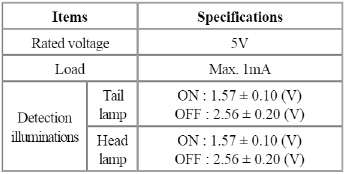
Components and Components Location
Component Location
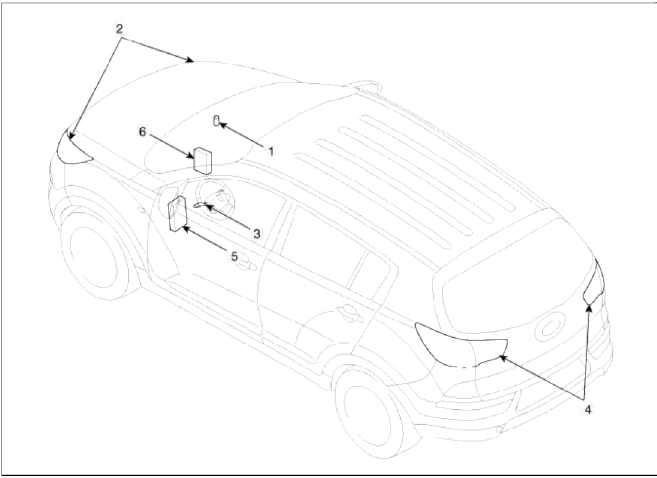
- Auto light sensor
- Head lamps
- Lighting switch (Auto)
- Tail lamps
- SJB (Smart Junction Box)
- BCM (Body Control Module)
Schematic Diagrams
Circuit Diagram
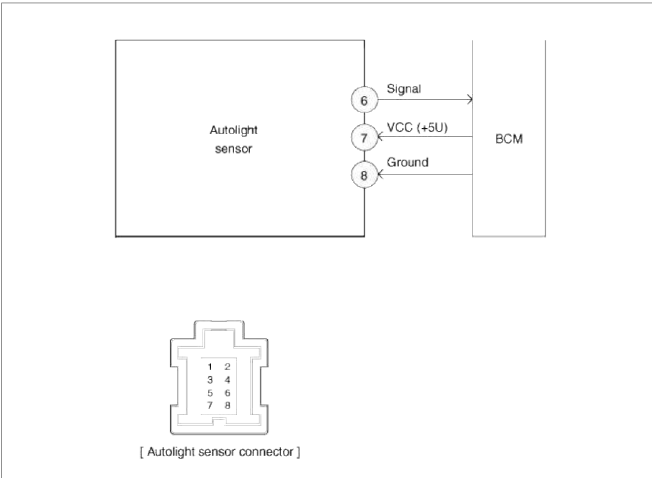
-
Photo signal (+)
-
-
Photo signal, RH (-)
-
-
Photo signal, LH (-)
-
Signal
-
VCC (+5V)
-
Ground
Description and Operation
Description
This function describes the following features
- Input detection by Auto Light Sensor.
- Generate Auto Light Out Status data.
- Send Auto Light Out Status.
- Tail Lamp Control by Auto light Mode.
- Head Lamp Low Control by Auto light Mode.
- AV Tail Control by Auto Light sensor level.
- Auto Light Mode State Diagram is based on Auto Light Sensor's level.
- Power condition of Auto Light Action
- When ACC, IGN, START terminal states, Auto Light Sensor operates.
Auto Light Sensor
Repair procedures
Inspection
In the state of IGN1 ON, when multi function switch module detects auto light switch on, tail lamp relay output and head lamp low relay output are controlled according to auto light sensor's input.
The auto light control doesn't work if the pin sunlight supply (5V regulated power from Ignition 1 power to sunlight sensor) is in short circuit with the ground.
If IGN1 ON, The IPM monitors the range of this supply and raises up a failure as soon as the supply's voltage is out of range. Then this failure occurs and as long as this is present, the head lamp must be turned on without taking care about the sunlight level provided by the sensor.
This is designed to prevent any head lamp cut off when the failure occurs during the night.
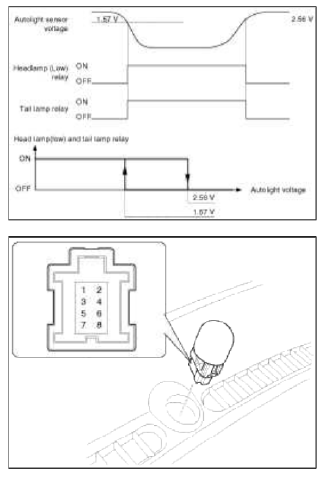
Removal
1. Disconnect the negative (-) battery terminal.
2. Remove the photo & auto light sensor (A) from crash pad upper side by using a flat-up screwdriver.
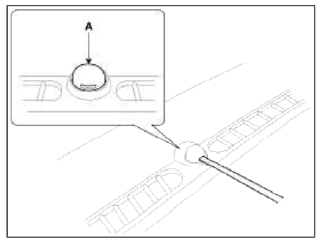
3. Remove the auto light sensor connector.
Installation
1. Reconnect the auto light sensor connector.
2. Install the auto light sensor.
READ NEXT:
 Schematic Diagrams, Description and Operation
Schematic Diagrams, Description and Operation
Schematic Diagrams
Circuit Diagram
Description and Operation
Description
The immobilizer system will disable the vehicle unless the proper ignition
key is used, in addition to the
SEE MORE:
 General Information, Troubleshooting, Special Service Tools
General Information, Troubleshooting, Special Service Tools
General Information
Specification
Air Conditioner
Blower Unit
Heater And Evaporator Unit
Troubleshooting
Troubleshooting
Problem Symptoms Table
Before replacing or repairing air conditioning components, first determine if
the malfunction is due to the refrigerant
charge,
 Rear View Monitor settings
Rear View Monitor settings
Rear View Monitor (RVM) (if equipped)
Rear View Monitor will show the area
behind the vehicle to assist you when
parking or reversing.
Detecting sensor
Rear view camera
Refer to the picture above for the
detailed location of the detecting sensor.
Rear View Monitor settings
Camera se
Content
- Home
- Kia Sportage - Fifth generation (NQ5) - (2022-2026) - Owner's Manual
- Kia Sportage - Second generation (JEKM) (2005-2015) - Body Workshop Manual
- Kia Sportage Third generation (SL) - (2011-2016) - Service and Repair Manual
- Sitemap
- Top articles